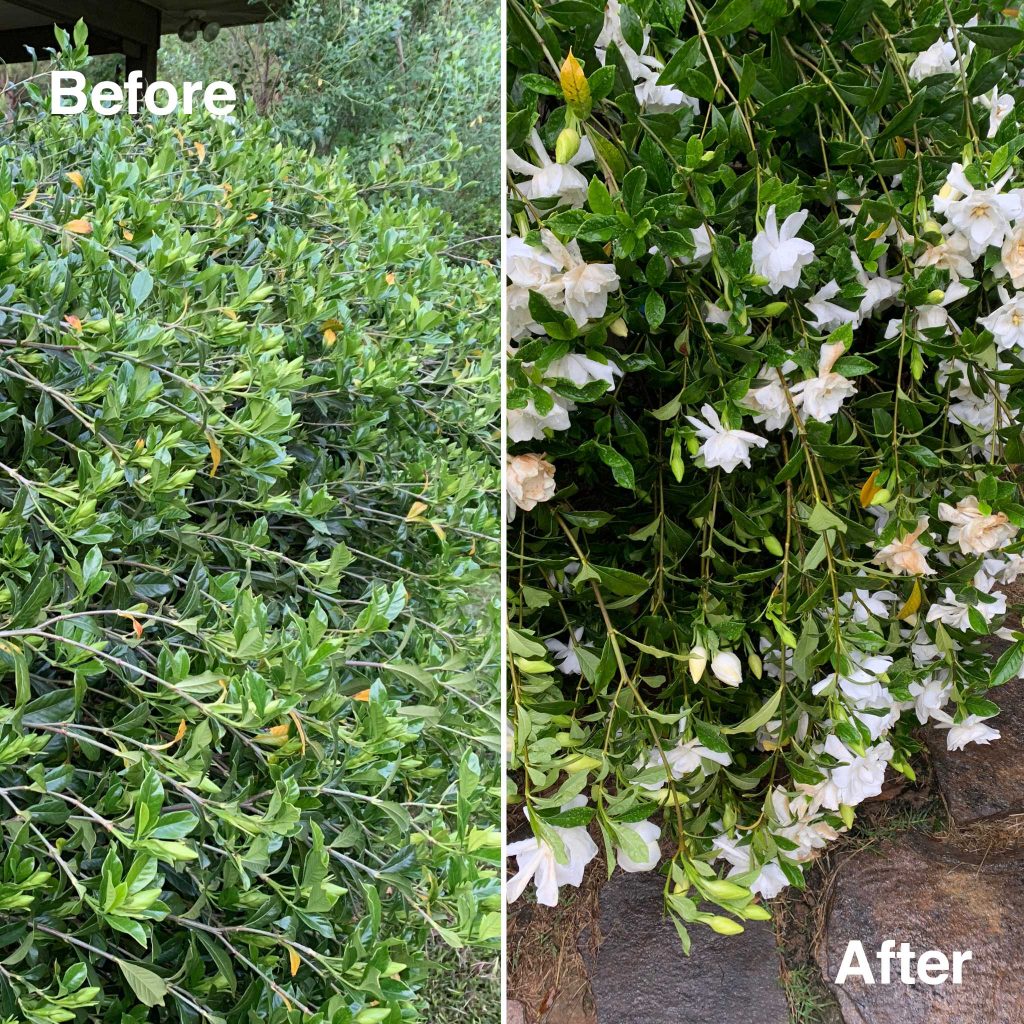by Angela Arndt, @aearndt
Replicating Childhood Summers
My childhood summers revolved around the scent of my neighbor’s gardenia bush. It shaded the porch swing where we’d congregate each afternoon, hot and exhausted. There we’d swing back-and-forth, inhaling that heady fragrance until it was time to go home.
When co-worker gave us gardenia bushes (new growth she’d rooted in sand) for our yard, I wasn’t sure they’d live. They’re perfect for butterflies, hummingbirds, and, of course, our honeybees, so we planted them all around our house and made another row in front of the woods. And they grew in the fertile ground, so much so we have to “prune” them down to the stumps every other year (usually with a chain saw) or those lovely shiny green bushes would engulf the house.
Maintenance is Required
It seems brutal but pruning keeps growth in check and increases the number of blossoms. However, last year the task fell to the bottom of our list, so I expected only a few blossoms. But I was so surprised just a few weeks ago to notice every branch tipped with hard, chartreuse buds.
The entire bush drooped with the weight and I feared they’d break. But the next week they exploded with gorgeous white velvet blossoms. There are so many that our dogs are afraid to go through the gauntlet of flowers. And the exquisite perfume I love? Whew! Now I know what “cloying” means.
The Gardenia Writer
Our precious works-in-progress start with an idea, just a stick in a cup of sand. Some water the plant with character charts and plotting diagrams before repotting it into a word document. Others set it out in the yard, growing branch after branch by the seat-of-their-plants.
Our words flow from our fingers, spilling the scenes in our mind onto the screen. Our stories, like our plants and lives, can become complicated, overgrown, even ugly. How do we know what to lop and what to leave?
Prioritize, Prune, and Pray
- Prioritize
No one can do everything. Accept that fact and move on. Beth Vogt always focuses on upping her game by just one thing with each new book. Decide on your focus, whether characterization, deepening the emotion, moving along the plot, using close POV, or something else, then put that focus where you see it before each session. - Prune
Before you start, duplicate each chapter so a little mistake won’t ruin your work. (If only we could do that with plants.) Don’t know how to start? Check out the Novel.Academy’s great Peptalks for ideas and instructions. - Pray
Pray about your work-in-progress before, during, and after your work. Our stories entertain, but they also should uplift and offer hope.
My poor, overgrown gardenias could be an object lesson for life, too. Our blessings can overwhelm too. The same advice applies: sharpen our focus, cut away the excess and always, always pray.
Your Turn
What pruning tips for writing (or life) do you have?

Angela Arndt writes women’s fiction with a thread of romance, telling stories of strong, independent women in difficult situations set in small Southern towns. Her biggest hope is that she will encourage her readers to overcome their own “back roads” and find joy in the Lord again. Represented by Rachelle Gardner of Books & Such Literary Agency, Angela has a Master’s Degree from the University of South Carolina and continues learning the craft of writing fiction through the American Christian Fiction Writers (ACFW) and Novel Academy. Connect with her at Facebook, Twitter, and Instagram

